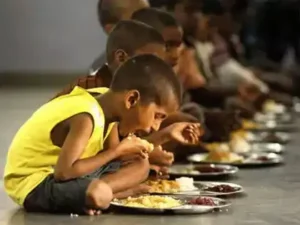GS2 – Social Sector

Context:
According to the UN’s State of Food Security and Nutrition in the World 2025 report, global undernourishment has declined, with India making significant contributions.
Global and National Trends
- Global Hunger: 673 million people (8.2%) were undernourished in 2024, down from 688 million in 2023.
- India: Undernourishment fell from 14.3% to 12% between 2020–2024, reducing the hungry population by 30 million.
Key Drivers of India’s Progress
- Public Distribution System (PDS): Digitalisation through Aadhaar-linked authentication, One Nation One Ration Card portability, and e-PoS monitoring improved efficiency; now serving over 800 million people.
- Nutrition-Focused Schemes:
- PM POSHAN enhances school meals with dietary diversity.
- Integrated Child Development Services (ICDS) supports child and maternal nutrition, alongside efforts to keep healthy diets affordable.
- Digital Platforms: Tools like AgriStack, e-NAM, and geospatial technologies improve market access and agricultural efficiency.
Emerging Concerns
- Malnutrition: Rising rates of micronutrient deficiencies, obesity, and poor diets despite reduced hunger.
- Affordability of Healthy Diets: Over 60% of Indians cannot afford nutrient-rich foods due to high costs and weak cold-chain infrastructure.
- Food Loss: Approximately 13% of food is lost between farm and market, affecting availability and affordability.
Way Forward
- Increase production and affordability of nutrient-rich foods.
- Invest in post-harvest infrastructure, including cold storage and logistics.
- Strengthen Farmer-Producer Organisations (FPOs) with a focus on climate resilience.
- Leverage India’s digital food security model to support SDG 2 (Zero Hunger) and serve as a template for South-South cooperation.




